If you have a cat and are thinking about adding a skunk to your family (or vice versa), the first thing you might want to know is if these specific individuals will get along.
Jokes aside, while there are some guidelines for cats with pet mammals in general, it always comes down to your specific circumstances and how well your current pet will most likely do with a feline or a mammal.
Planning ahead is the best way to ensure your skunk will get along with your cat.
That being said, if you already have both of them, it’s definitely not too late to establish a positive relationship.
Albeit an untraditional relationship, your skunk can definitely become friends with your cat.
I’ve thought about bringing home a skunk and introducing them to my female British Shorthair too so I’ve looked into it quite a bit.
Since my cat is very friendly and can be relatively gentle with smaller animals, I personally don’t worry too much on that front.
The main reason why I’ve put it off is to do some more research on diet, handling, breeding, and so on.
In the process, I’ve seen and read quite a bit that involves skunks with cats or other pets.
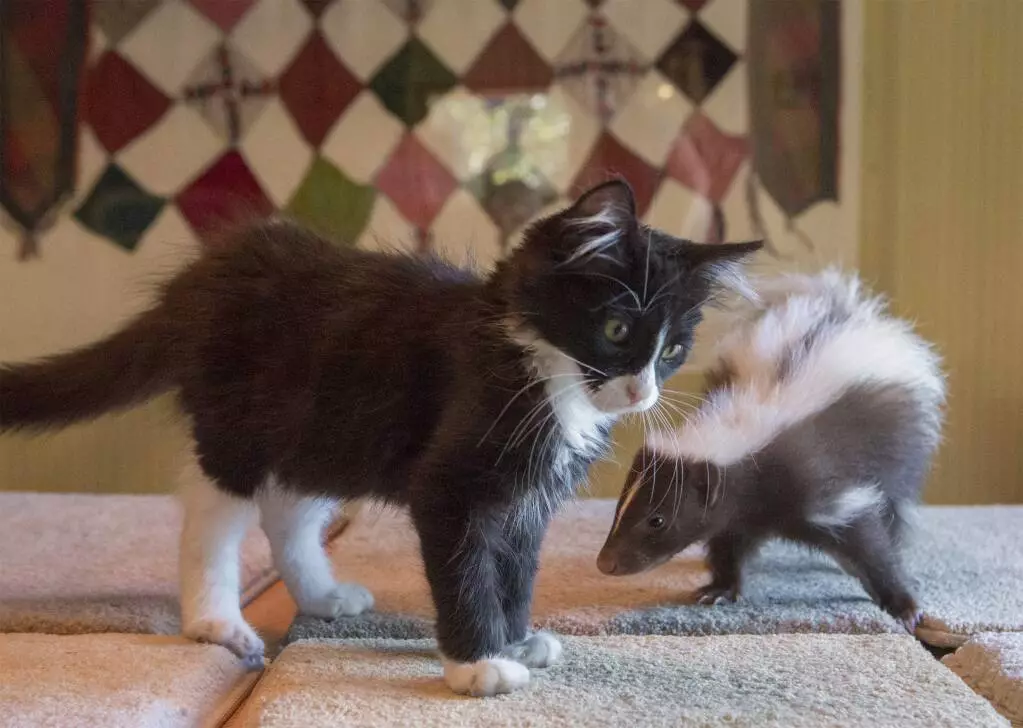
Are Cats Scared Of Skunks?
Yes, skunks and cats can get along if their temperaments match and they have been socialized early on in addition to the cat being trained how to behave around a smaller mammal.
That being said, you should always supervise your skunk and your cat when they have direct access to each other.
Also, introducing them properly is key so don’t mess up their relationship by hastily throwing them at each other.
You can start by showing your cat the enclosure while keeping a distance so the skunk won’t be scared.
Gradually, you can show your cat the skunk in your hand (assuming the skunk is relatively tame and enjoys being handled by humans).
Don’t let your cat too close but also don’t let the skunk roam freely since the running might cause unnecessary excitement on your cat’s part.
Some brave skunks might even chase your cat, especially if you have a smaller cat.
Don’t start their relationship with any shenanigans as one of them could interpret play as an attack and perhaps even defend themselves.
So keep in mind to calmly and gradually introduce your two pets to each other and your skunk and cat will most likely get along.
Do Skunks Like Cats?
Although skunks and cats can get along very well, the problem appears when a feral cat fight with skunks over territory. Skunks are very unaggressive creatures and do not want an encounter with others.
Therefore, most skunks will try to avoid any type of interaction with your act and are, instead, mostly occupied with digging for shelter in burrows, especially during winter.
Their homes can overlap a great range from typically 2 to 4 km2, and because this range is so big, chances are likely they may come upon your cat, or other animals in their vicinity. But even if that happens, they will try to avoid your cat by all means, unless they’re angry or in some type of distress.
Skunk Chasing My Cat
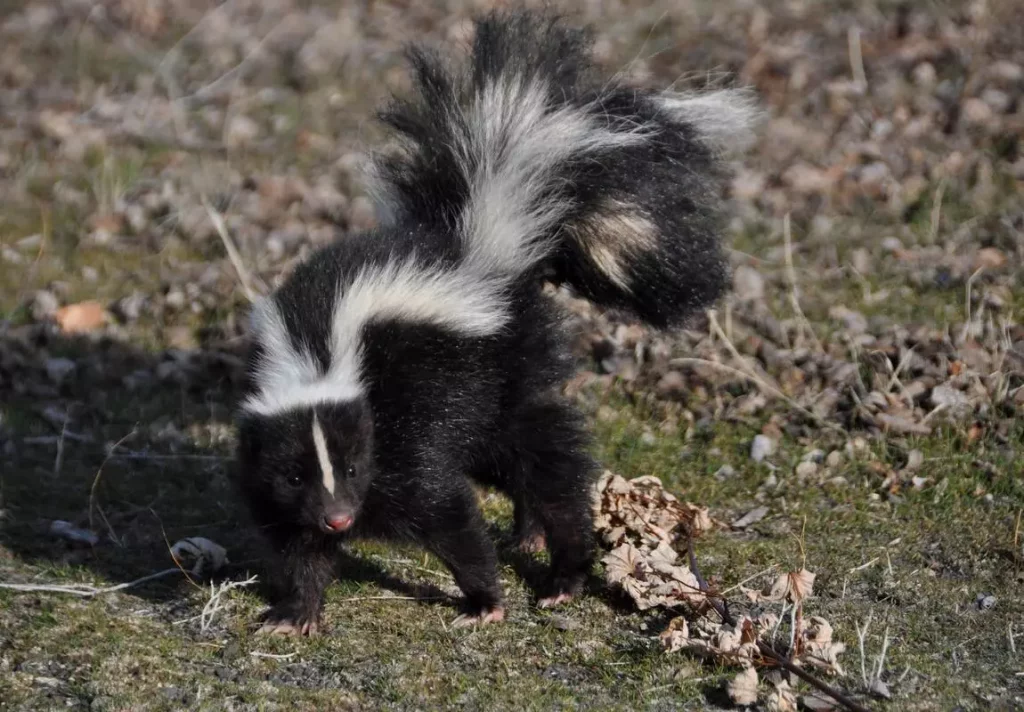
It’s not a good idea to let your skunk chase your cat if they’ve just recently been introduced to each other.
While this may seem funny, it can seriously make your cat want to avoid the skunk or even defend himself.
It often happens to smaller cats but can also happen to rescued cats or even skittish large cats who haven’t been exposed to smaller pets before.
What’s not helping is the fact that some skunks are overly brave and think – for whatever reason – that chasing felines around the house is a superb idea.
If your cat displays playful behavior (i.e. play bows, relaxed posture, etc.) and the play isn’t too harsh, then that might be great but always keep an eye on them.
Do Cats Eat Skunks?
Cats should be desensitized and trained how to behave around skunks so they don’t accidentally take the small pet into their mouth and perhaps even ingest them.
Generally speaking, cats will not eat skunks but it can definitely happen.
They’re not among a cat’s (or wolf’s) natural prey but your cat might try to play with the mammal and if your cat is really mouthy, that could potentially lead to an issue.
It’s best to never leave your skunk and cats unsupervised to avoid accidents, especially with larger cats.
While you can definitely give a skunk some time outside the enclosure with your cat, they’re better off inside the enclosure anyway due to the temperature and lightning (i.e. UV light, basking spots, etc.).
Can Cats Get Salmonella From Skunks?
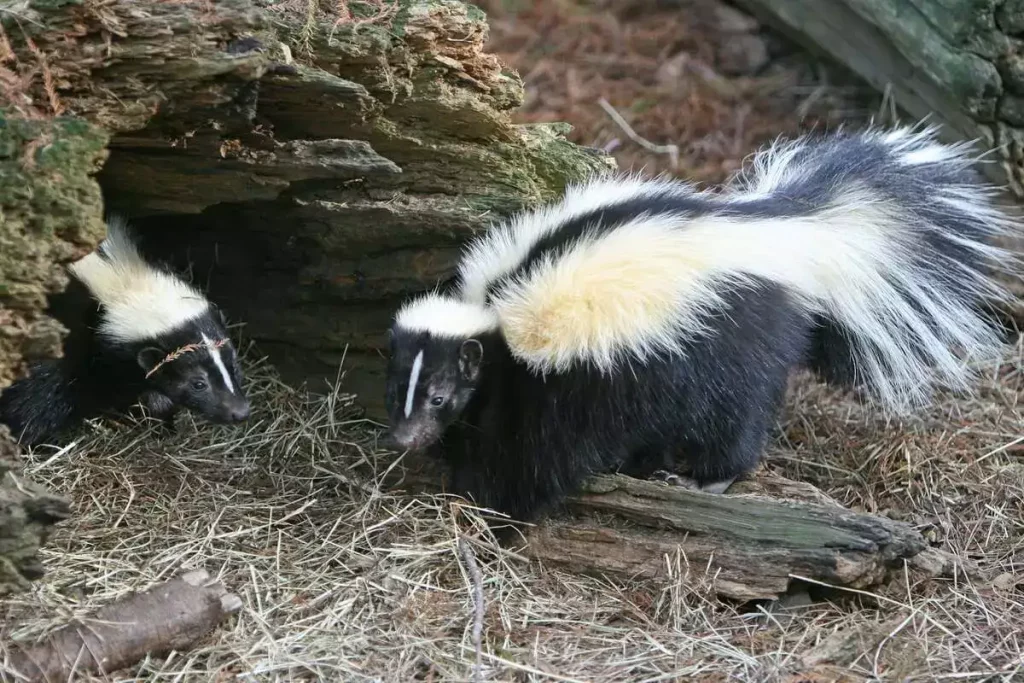
Yes, cats can get salmonella from skunks which can then be silent carriers and infect humans in the household.
Cats always have these bacteria in their GI tract but usually, they won’t have any symptoms.
However, cats can still be infected by your skunk and then transmit salmonella to you.
Skunks have been linked to a couple of salmonella infections according to the CDC but you can take precautions to reduce the risk.
The main way these bacteria spread is through the skunk’s droppings but once they come into contact with it themselves, their whole area and even saliva can spread the bacteria.
- Don’t get into contact with your skunk’s feces (and don’t let your cat sniff or even ingest them)
- Clean their enclosure regularly and disinfect items
- Wash your hands after interacting with your skunk
- Keep the skunk away from the kitchen, food, or your face if you want to be sure
Naturally, these rules will extend to your cat to some degree.
Cats most commonly spread bacteria through their feces too (think potty accident at home) which is probably the less likely route of spreading it to you
However, they can also come in contact with your skunk’s salmonella and then kiss you, you touch your face, and voila – you can theoretically have a salmonella infection.
Your cat will most likely not infect your skunk with salmonella but it can happen if your cat had salmonella first and had a potty accident, or if he licks contaminated areas and then goes on to lick your skunk’s area.
How do cats get salmonella? Contaminated feces outside (whether it’s their own or from a kind stranger), interaction with other cats who have it, or simply through their food.
Yes, a raw diet where you don’t clean and disinfect all surfaces properly can spread the bacteria easily, but dry kibble can also be contaminated so always be on the lookout and clean everything.
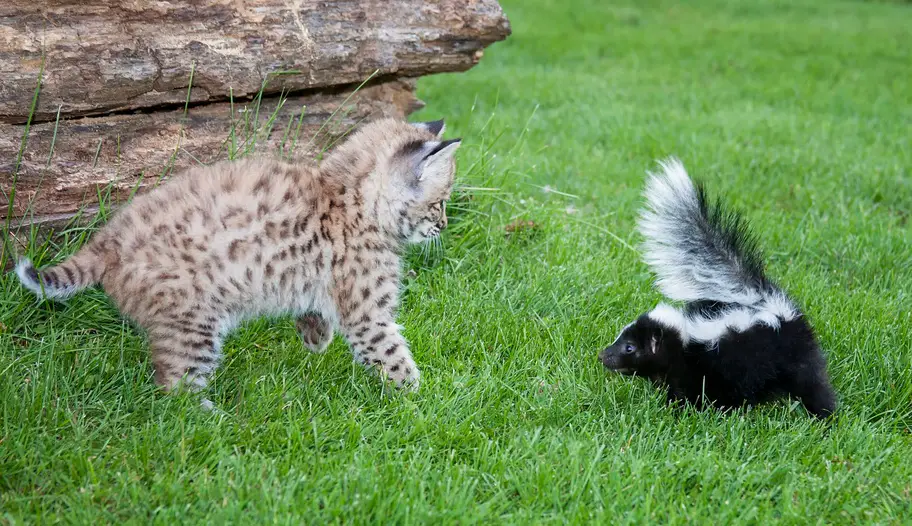
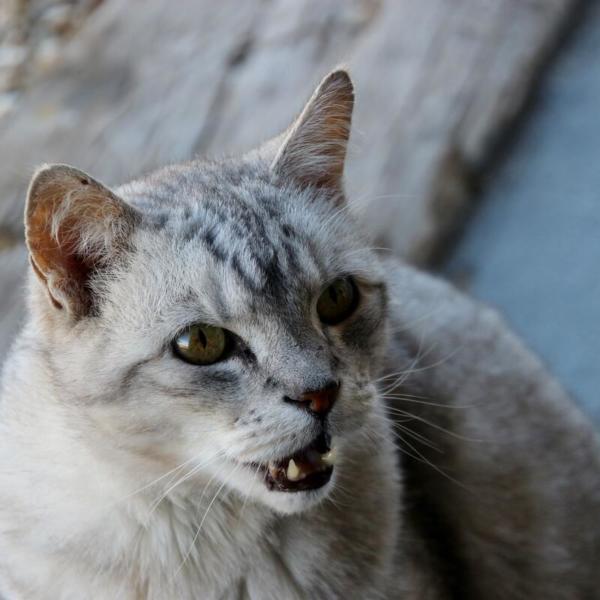
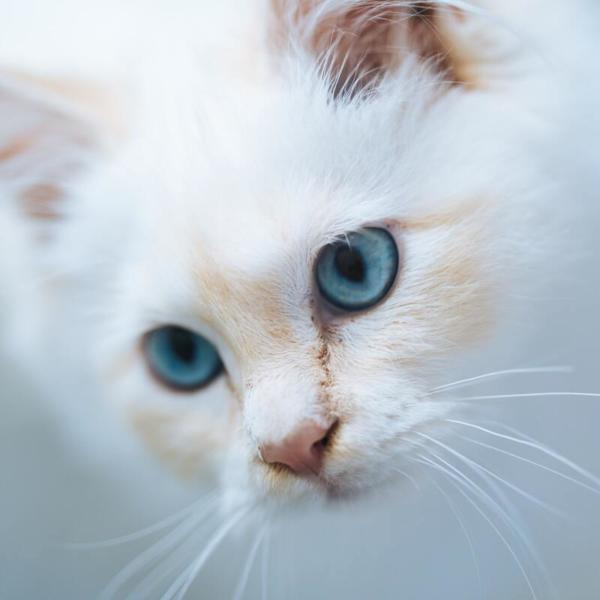
Leave a Comment